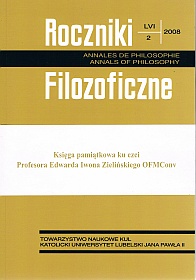Roger Bacon’s Critique of the Medieval Translations of Aristotle’s Writings
Abstract
The paper open with an outline of Roger Bacon’s linguistic interests. He claimed that the knowledge of languages is the propedeuctics of any knowledge because it is formulated in the Hebrew, Greek, and Arabic languages, and no translation can fully render the original text. There are also other reasons for which the knowledge of languages is necessary for the functioning of the Church, e.g. in the Liturgy or for missionary purposes. Bacon distinguished three stages of the command of a language, and the second is the skill of translation postulated for each person that studies philosophical and theological texts. This programme was too idealistic and, if only for the scarcity of original texts, it could not be carried out on a broader scale in medieval universities doomed to use Latin translations. And these translations were so negatively evaluated by Roger Bacon. He referred to his knowledge of some details that showed the translators’ incompetence.
Then the paper discusses Bacon’s opinions on medieval translators. It indicates Bacon’s chronological mistakes and his lack of information with reference to many facts about the translator’s movements. It provides some possible reasons for Bacon’s ignorance and his harsh evaluation of that movement. There were the following reasons for that: he distanced himself from some learned information due to the fact that Aristotle had for many decades been condemned in Paris, there were excessive expectations in relation to the alleged astronomic and astrological knowledge of Aristotle, and its lack was painful for this scholar. He failed to be aware of the vagueness of Aristotle’s original text due to, among other things, only a rudimentary knowledge of Greek that Roger Bacon had, and Greek original texts were inaccessible. One may also mention a tendency typical of Bacon to trace causes of mistakes and his fear of being rush in creating authorities.
Bacon’s testimony concerning William of Moerbeke is discussed in detail. This was done with a view to show that Bacon conveys some information that is not true and some that can be regarded as trustworthy or hypothetical in further research on the life and literary work of this medieval translator. The unique piece of information is that William of Moerbeke decided to revise the ancient translations of Aristotle’s writings. Bacon’s negative opinion about William’s translator’s skills must be treated as unjust, although contemporary research shows that, despite his indisputable accomplishments, William’s translations have some drawbacks. Accordingly, we cannot completely reject Roger Bacon’s testimony.
References
Bacon R.: Compendium studii philosophiae, ed. J. S. Brewer, London 1859.
Bacon R.: Dzieło większe, tł. T. Włodarczyk, Kęty 2006.
Bacon R.: Opus tertium, ed. J. S. Brewer, London 1859 (pol.: Bacon R.: Opus tertium, tł. T. Włodarczyk, [w:] Wszystko to ze zdziwienia. Antologia tekstów filozoficznych z XIII wieku, red. K. Krauze-Błachowicz, Warszawa 2002).
Beullens P. : Guillaume de Moerbeke et sa traduction de l’Historia animalium, [w:] Tradition et traduction. Les textes philosophiques et scientifiques grecs au Moyen Age latin, red. R. Beyers, J. Brams, Leuven 1999.
Bossier F.: Documents d’archives concernant une famille „ de Moerbeke”, [w:] Guillaume de Moerbeke, Recueil d’études à l’occasion du 700 anniversaire de sa mort (1286), red. J. Brams, W. Vanhamel, Leuven 1989, s. 385-387.
Brams J.: Guillaume de Moerbeke et Aristote, [w:] Rencontres de cultures dans la philosophie médiévale. Traductions et traducteurs de l’antiquité tardive au XIV siècle, red. J. Hamesse, M. Fattori, Louvain-la Neuve-Cassino 1990.
Frankowska M.: „Scientia” w ujęciu Rogera Bacona, Warszawa 1969.
Guldentops G.: Some critical observation on Moerbeke’s translation of Themistius’ paraphrase of De anima, [w:] Tradition et traduction. Les textes philosophiques et scientifiques grecs au Moyen Age latin, red. R. Beyers, J. Brams, Leuven 1999, s. 249-264.
Lemay R.: Roger Bacon’s Attitude Toward the Latin Translations and Translators of the Twelfth and Thirteenth Centuries, [w:] Roger Bacon and the Sciences. Commemorative Essays, red. J. Hackett, Leiden 1997, s. 25-37.
Rosier-Catach I.: Roger Bacon and Grammar, [w:] Roger Bacon and the Sciences. Com-memorative Essays, red. J. Hackett, Leiden 1997, s. 67-68.
Southern R. W.: Robert Grosseteste. The Growth of an English Mind in Medieval Europe, Oxford 1992.
Uhl F.: Hindernisse auf dem Weg zum Wissen. Roger Bacons Kritik der Autoritäten, [w:] Roger Bacon in der Diskussion, hrsg. von F. Uhl, Frankfurt am Main 2001, s. 219-235.
Vanhamel W.: Biobibliographie de Guillaume de Moerbeke, [w:] Guillaume de Moerbeke, Recueil d’études à l’occasion du 700 anniversaire de sa mort (1286), red. J. Brams, W. Vanhamel, Leuven 1989, s. 309-318.
Wingate S. D.: The Medieval Latin Versions of the Aristotelian Scientific Corpus with Special Reference to the Biological Works, London 1931.
Copyright (c) 2008 Roczniki Filozoficzne

This work is licensed under a Creative Commons Attribution-NonCommercial-NoDerivatives 4.0 International License.





